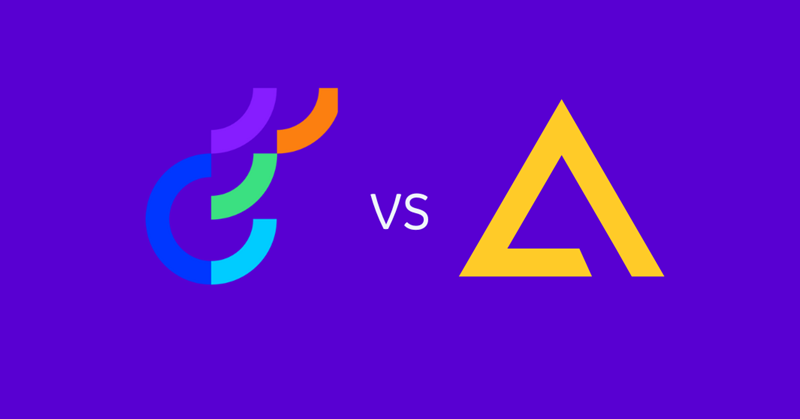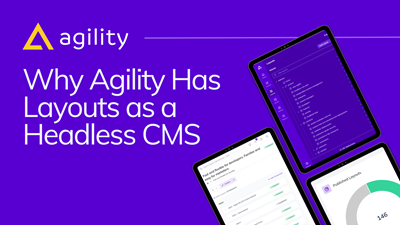Optimizely vs Agility CMS

The Content Management industry is full of worthy contenders, and for us, it’s important to be able to cut through the noise and give you the tools to make an informed decision. In this showdown, we compare Optimizely vs Agility CMS.
Optimizely Overview
Optimizely is a leading experimentation and optimization platform designed to help businesses enhance their digital experiences, increase engagement, and drive conversions. With its suite of powerful tools and features, Optimizely empowers companies to create, manage, and analyze A/B tests, multivariate tests, and personalization campaigns across websites, mobile apps, and other digital touchpoints.
Agility CMS Overview
Agility CMS is a cutting-edge headless content management system (CMS) that empowers businesses to seamlessly manage and deliver content across diverse digital channels. Embracing a headless architecture, Agility CMS decouples content creation from presentation, enabling unparalleled flexibility and customization. This platform empowers developers with APIs to effortlessly retrieve and display content, while offering marketers an intuitive interface for content creation and management. With features like content modeling, real-time collaboration, and robust security, Agility CMS serves as a dynamic solution for organizations aiming to provide dynamic and personalized digital experiences while efficiently adapting to the ever-changing landscape of modern content delivery.
Why Opt for Agility CMS?
In today's fast-evolving digital realm, Agility CMS steps forward as a tailored solution for businesses grappling with unique content complexities. This CMS offers personalized support from start to finish, excels in intricate content needs, aligns with the MACH Alliance for interoperability, boasts a user-friendly interface, and adopts a flexible, integrated approach. Agility CMS empowers businesses to master content management, deliver engaging experiences, and stay ahead in the digital landscape.
Optimizely VS Agility CMS: What's the Difference?
Agility CMS and Optimizely serve distinct yet complementary purposes. Agility CMS is a versatile content management system focusing on efficient content creation, management, and delivery across various channels. It offers tailored support, excels in complex content needs, and follows a composable architecture for flexibility.
On the other hand, Optimizely is an experimentation and optimization platform that enables businesses to conduct A/B testing, personalization, and multivariate testing to enhance user experiences and drive conversions. It provides data-driven decision-making tools while offering integrations and analytics for optimizing digital strategies.
In essence, Agility CMS streamlines content management, while Optimizely focuses on data-driven optimization and experimentation to achieve better results in the digital realm.
Agility CMS and Optimizely can be used as headless CMS solutions.
Agility CMS: Agility CMS offers a headless content management approach where content creation and management are decoupled from its presentation. This allows developers to retrieve content through APIs and present it in various formats across digital channels. Agility CMS's headless capabilities provide flexibility and enable businesses to create consistent and dynamic experiences on websites, apps, and other platforms.
Optimizely: Optimizely, primarily known for its experimentation and optimization features, also supports a headless approach. While its main focus is on A/B testing, personalization, and optimization, Optimizely allows you to manage and deliver content through APIs and integrate it with your frontend systems to ensure cohesive and targeted user experiences.
Both platforms offer the advantage of headless content management, allowing you to separate content creation from its delivery, which is particularly useful for delivering content consistently across various digital touchpoints and devices. However, evaluating each platform's specific features, capabilities, and integration options is essential to determine which one aligns best with your organization's needs and goals.
Why Optimizely is a Popular Option
Optimizely is popular due to its robust experimentation and optimization features, enabling businesses to enhance user experiences, drive conversions, and make data-driven decisions for better digital performance.
The Drawbacks of Optimizely
Optimizely, while renowned for its robust experimentation and optimization prowess, may not be the optimal choice for a headless CMS solution. Its primary strength lies in A/B testing, personalization, and optimization, which might overshadow its capabilities as a headless CMS. Optimizely's focus on these features means that its headless content management functionalities might lack the depth and flexibility found in dedicated headless CMS platforms.
Furthermore, Optimizely's interface and workflows are designed primarily for experimentation and optimization tasks, which might not align seamlessly with content management needs in a headless environment. Integrating Optimizely as a headless CMS might result in suboptimal content authoring experiences and hinder collaboration between content creators and developers.
If your main goal is headless content management, exploring platforms explicitly designed for this purpose could be more advantageous. Dedicated headless CMS solutions often provide more refined content management interfaces, deeper API capabilities, and enhanced collaboration features that cater to the unique demands of headless architecture. However, if experimentation and optimization remain your primary focus, using Optimizely alongside a dedicated headless CMS might be a strategic approach to achieve a balance between content management and optimization.
Here are some of the common problems that users have highlighted:
-
Complexity for Beginners: Some users have found Optimizely to have a steeper learning curve, especially for those new to A/B testing and experimentation. The platform's robust features can be overwhelming for beginners.
-
Pricing: Optimizely's pricing structure has been a concern for some users. Depending on the package and features required, the cost can be quite high for smaller businesses. Users have reported that pricing might not always align with the perceived value they receive.
-
Performance and Speed: In some cases, users have experienced slow loading times when using Optimizely, which can impact the overall user experience on their websites. Slow performance can also make setting up and running tests challenging.
-
Technical Issues: Optimizely has occasionally encountered technical glitches and bugs like any software. Some users have reported issues with the stability of the platform, which can disrupt testing schedules and cause frustration.
-
Limited Integration: Although Optimizely offers integrations with various tools and platforms, users have occasionally reported difficulties integrating with specific third-party software, which can hinder the smooth flow of data and insights.
-
Version Changes: Optimizely has undergone significant changes, including rebranding and merging with other companies. These changes can sometimes lead to confusion among users, especially if they are not adequately communicated or if features change unexpectedly.
-
Support and Customer Service: While some users have had positive experiences with Optimizely's customer support, others have reported challenges in receiving timely assistance or finding solutions to their issues.
-
Customization and Flexibility: Some users have expressed that Optimizely's platform might not offer the same level of flexibility and customization as they would like. This could concern businesses with unique testing needs or specific requirements.
-
Resource Intensiveness: Implementing and managing tests through Optimizely can be resource-intensive, requiring dedicated time and effort from your team to set up and monitor experiments effectively.
-
Data Accuracy: Occasionally, users have reported discrepancies in the data provided by Optimizely, which could affect the accuracy of their test results and decision-making.
Agility CMS: The Optimizely Alternative
Agility CMS presents a compelling alternative to Optimizely, addressing many of the challenges highlighted by users. First and foremost, Agility CMS provides a user-friendly interface that simplifies content creation and management, making it an excellent choice for beginners and teams with varying levels of expertise. Unlike Optimizely's potential complexity, Agility CMS ensures a smoother learning curve, enhancing overall usability.
Moreover, Agility CMS offers transparent and flexible pricing structures, catering to businesses of all sizes without compromising value. This aligns better with users' expectations compared to concerns about Optimizely's pricing. Additionally, Agility CMS prioritizes performance and speed, minimizing slow loading times and optimizing the user experience across digital platforms.
Addressing technical issues, Agility CMS is known for its stability, reducing disruptions caused by glitches or bugs – contrasting some users' experiences with Optimizely. The platform's robust support and customer service ensure timely assistance, mitigating challenges in finding solutions. Furthermore, Agility CMS's integrations are designed to be comprehensive, fostering seamless data flow and insights, unlike the potential integration difficulties faced by Optimizely users.
Agility CMS's commitment to consistency is evident in its approach to version changes, minimizing confusion and ensuring that updates are communicated effectively. The platform's flexibility and customization capabilities surpass Optimizely's, accommodating unique testing needs and specific requirements. By efficiently managing resources and prioritizing data accuracy, Agility CMS addresses concerns about resource intensiveness and data discrepancies that some users encountered with Optimizely.
In summary, Agility CMS emerges as a well-rounded alternative that offers a user-friendly experience, flexible pricing, optimal performance, robust support, seamless integrations, stability, and customization capabilities – effectively addressing the common issues associated with Optimizely.

